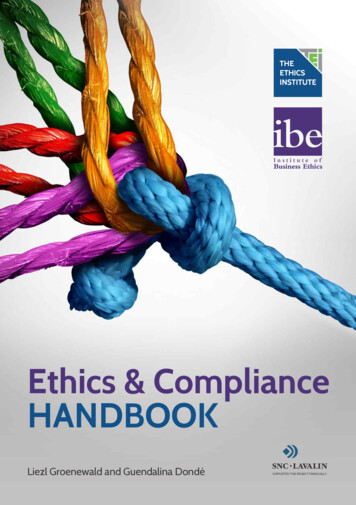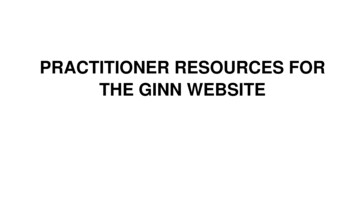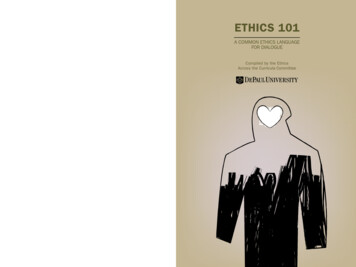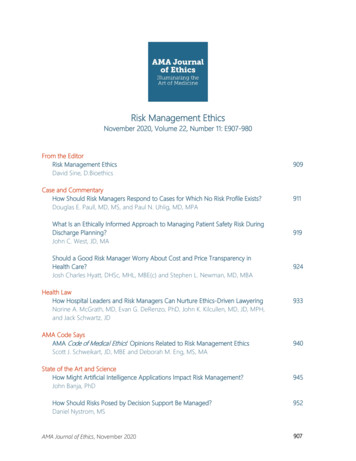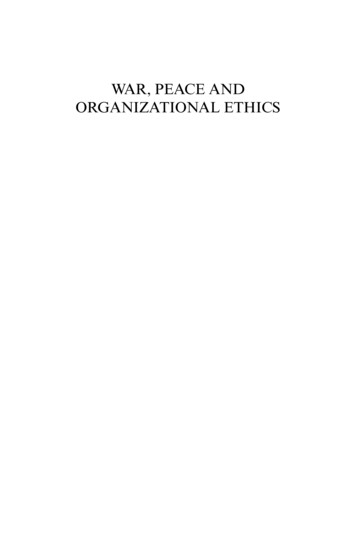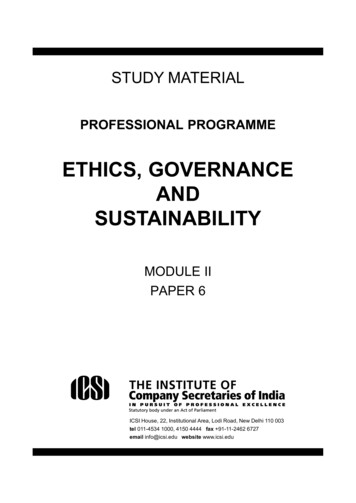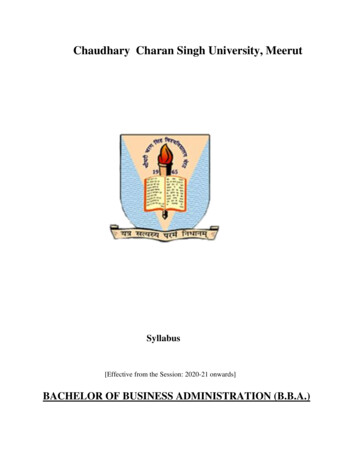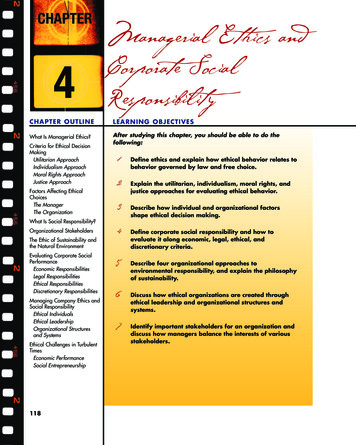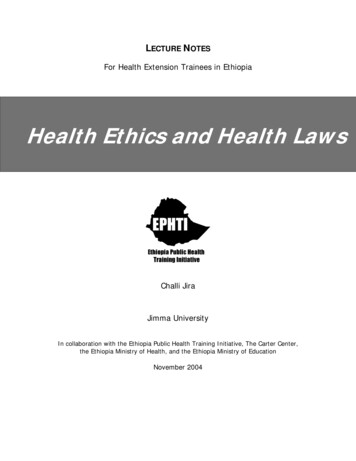
Transcription
LECTURE NOTESFor Health Extension Trainees in EthiopiaHealth Ethics and Health LawsChalli JiraJimma UniversityIn collaboration with the Ethiopia Public Health Training Initiative, The Carter Center,the Ethiopia Ministry of Health, and the Ethiopia Ministry of EducationNovember 2004
Funded under USAID Cooperative Agreement No. 663-A-00-00-0358-00.Produced in collaboration with the Ethiopia Public Health Training Initiative, The CarterCenter, the Ethiopia Ministry of Health, and the Ethiopia Ministry of Education.Important Guidelines for Printing and PhotocopyingLimited permission is granted free of charge to print or photocopy all pages of thispublication for educational, not-for-profit use by health care workers, students orfaculty. All copies must retain all author credits and copyright notices included in theoriginal document. Under no circumstances is it permissible to sell or distribute on acommercial basis, or to claim authorship of, copies of material reproduced from thispublication. 2004 by Challi JiraAll rights reserved. Except as expressly provided above, no part of this publication maybe reproduced or transmitted in any form or by any means, electronic or mechanical,including photocopying, recording, or by any information storage and retrieval system,without written permission of the author or authors.This material is intended for educational use only by practicing health care workers orstudents and faculty in a health care field.
AcknowledgementsThe development of this lecture note for training Health Extensionworkers is an arduous assignment for Ato Challi Jira at JimmaUniversity.Essentially, it required the consolidation and merging of existing indepth training materials, examination of Health Extension Packagemanuals and the Curriculum.Recognizing the importance of and the need for the preparation of thelecture note for the Training of Health Extension workers THECARTER CENTER (TCC) ETHIOPIA PUBLIC HEALTH TRAININGINITIATIVE (EPHTI) facilitated the task for Jimma University to nsionCoordinating Office of the Federal Ministry of Health.Finally the Federal Ministry of Health would like to express specialwords of gratitude for those who contributed and endeavored to thedevelopment of this lecture note and to TCC/USAID for the technicaland financial support.i
Table of ContentsTopicsPagesAcknowledgement . iTable of contents . iiIntroduction. 1UNIT ONE: Background and Rationale . 31.1 Background . 31.2 Rationale of Ethics . 8UNIT TWO: Health Ethics . 10UNIT THREE: Principles of Ethics for Health Extension Workers .15UNIT FOUR: Existing Health Laws in Ethiopia .22Bibliography .42Appendix 1: Public Health Proclamation .45ii
IntroductionCurrently the government of Ethiopia has decided to introduce aninnovative community-based health care delivery system aimed atcreating healthy environment as well as healthful living by introducinga Health Extension package programme.The health extension service is being provided as a package focusingon preventive health measures targeting households at the kebelelevel. A new cadre of health namely health extension ilitiesinimplementing health extension programme.The delivery of a meaningful health service can only be successfulwhen accompanied by sound principle of Health Ethics and adequateknowledge of health laws related to health service delivery system.Ethics is a system of moral principles, rules of conduct about aparticular class of human action or a particular group of people. It isalso that branch of philosophy dealing with value relating to humanconduct in respect to whether certain actions are right or wrong andwhether the motives and ends of such actions are good or bad.The issue of human rights-personal, civic and those that areinternational in scope has been brought often to the public’s attention1
in the past several years. Nowhere is this issue more important thanin delivery of health care.The preparation of this lecture note on health Ethics and health lawsis important and timely as there is no appropriate book to address thesubject in teaching health Extension Package Workers.As morals and ethics of society in general are changing, health careethics merely reflects and absorbs this change. It is obvious,therefore that this lecture note of health Ethics and health laws forhealth extension package workers will require periodic review basedon social, health and legal progress.2
UNIT ONEBackground and Rationale1.1 BackgroundEthics is the philosophical study of the moral value of human conductand the rules that govern it. The practical manifestations of ethicsrelates to codes of normative behaviour for society and an awarenessof issues within society that have moral importance.Ethics have been particularly associated with specific groups insociety that are deemed to have societal responsibility. Professionsare among such groups. What is certain is that professions have aprestigious, powerful and trusted place in society and both the publicand the law expect high standards of conduct, especially wheresociety allows self-regulation.The purpose of this code of ethics is to serve as a guide to conductHealth Service Extension programmes. It contains standards ofethical behaviour for Health Extension workers in fulfilling their dutiesand responsibilities.3
Policy on HealthThe policy as supporting environment:Health has long been and is increasingly a concern of all people ascitizens of the world, as citizens of sovereign nations, as participantsin the endeavours of the field of social welfare/social development,and as professionals engaged directly or indirectly in various roles inthe human services.In keeping with their holistic view of the person, health extensionpackage workers view health as defined by the World HealthOrganization (WHO), namely as a positive state of physical, mentaland emotional well-being. Illness is seen as the converse of healthand includes suffering from sickness and disablement, contagiousdiseases and diseases of deprivation that involve the lack of food, ofclean water, of pure air, of safe shelter, of health services, and ofsocial services.The policy as a guide for action is a means for identifying andaddressing issues of health and illness that affect the individual, thefamily (and particularly the vulnerable family), the neighborhood, theregion, the country, and also the world - defined both as thecollectivity of all people and as the fragile and endangeredenvironment on which all life ultimately depends.4
Effective strategies on Health Service Development Programme(HSDP) call for informed support by individual health extensionworker, organizations on a range of broad public policies that includethe following: policies on the equitable distribution of health; policieson population and family planning; policies on the production of food;policies to eliminate adult illiteracy and to offer every child and youngperson the knowledge and skills needed for socially and economicallyproductive lives; policies on housing, shelter and space for securefamily and communal living; policies on the provision of education onhealth and safety and on occupational and lifestyle hazards; policieson the provision of child and maternal health services, immunizationand nutrition.The provision of health services is most effectively achieved withinthe ambit of "primary health care", WHO's conceptual frameworkwhich extends to the macro policies referred to above as well asfocusing on direct measures for individual and communal health.Health needs are best met when the functions and activities ofmedical, nursing and other health workers are integrated with HealthExtension Package Worker similarly trained in health prevention andpromotion.The importance of the issues associated with health impliesresponsibility for Health Extension worker to become familiar with itsextensive body of relevant knowledge, partly outlined as follows:5
The linkages between health policies and human rightspolicies including those relating to the rights of the child, therights of oppressed minorities and of refugees fleeing fromoppression; The structures and programmes of international governmentaland non-governmental organizations, and of multinationalcorporations, that have an impact on health and illness; The psychosocial aspects of illness, disability and disease; The factors that promote positive health and well-being; The range of social, economic, cultural and political factorsthat cause or contribute to illness and disability; The range of positive and negative factors in the physicalenvironment that affect the quality of air, water and food; The range and nature of physical, mental and emotionalillnesses and disabilities throughout the world; The factors affecting the HIV/AIDS pandemic and themammoth measures needed to prevent its proliferation, toameliorate and treat its physical, emotional, and socialsymptoms and to seek its cure;6
The special need for health care and other supportivemeasures for women and, especially, women caring forchildren; unicable diseases; The range of measures and modalities that have beendeveloped to prevent illness, disability and disease, lcoholconsumption and other forms of substance abuse, eatingdisorders, lack of physical activity and the operation ofvehicles under unsafe conditions; The range of measures and modalities, including traditionaland modern medicine, for the treatment of illness, disabilityand disease; The impact of working conditions on the health of workers andon family life; The functioning of inter-disciplinary teams and other forms ofcollaboration among different categories of health personnelthat contribute to healthy social policy; The role of consumers of health services, both as recipients ofthe services of others and in self-help roles;7
1.2 Rationale of Ethics for Health Extension WorkersThe mandate to assure and protect the health of the public is aninherently moral one. It caries with it an obligation to care for thewell being of others and it implies the possession of an element ofpower in order to carry out the mandate.The general conduct of public health practice concerns theprofessionals, individuals and the community at large. Ethicalissues often arise as a result of conflict among competing sets ofvalues, such as, in the field of public health, the conflict betweenthe rights of individuals and the need of communities.The code of ethics for public health will clarify the distinctiveelements of public health and the ethical principles that followfrom or respond to those distinct aspects. The Health Extensionworkers will be abided by code of ethics of public health inrendering public health services.The concerns of public health are not fully consonant with those ofmedicine, however, thus we can not simply translate the principlesof medical ethics to public health. For example, in contrast tomedicine, public health is concerned more with populations thanindividuals, and more with prevention than with cure.In the context of Health Service extension programme (HSEP) theethical issues include equity, justice, equality and human rights.8
These ideals should continue to be of primary importance inproviding Health service extension programme (HSEP). Healtheducation, nutrition, basic hygiene and sanitation, family health,immunization, prevention and control of HIV, TB, malaria and firstaid are major areas of focus in HSEP. Unless all these elementsare provided adequately and continuously without interruption,HSEP will have no meaning. There are no priorities in these, andthey must be offered as complete package.It is highly unethical to keep people ignorant about the causes,control and prevention of diseases, about a healthy life style, andabout the social and community responsibilities of the people. Yetthis is exactly what happens in the absence of public healtheducation.9
UNIT TWOHealth EthicsLearning objectives.At the end of this unit the trainee will be able to: Know applied principles of Ethics Understand basic concepts and definitions of Ethics Understand importance of Ethics Use information included in the unitEthics and MoralityHealth ethics have common features in different countries. However,each country adopts certain modifications according to prevailinglocal culture, religious beliefs, social norms and standards of publichealth practice. In Ethiopia, the need for modification of code of ethicsis based on current beliefs, standards of public health practice andreligious concepts. Certain matters which are peculiar to the practiceof profession of health extension are largely left to the conscience ofthe individual health extension worker, but the Ministry of Healthbyvirtue of its legal power vested upon it, has a particular interest tocodifying publicizing and enforcing ethical consideration on all healthcadres in Ethiopia.10
Definition of Ethics and MoralityThe word ethics is derived from the Greek ethos, which meanscustom or culture, a manner of acting or constant mode of behaviour.Thus, Health ethics may be defined as a code of behaviouraccepted voluntarily, within the profession as, opposed to laws,regulations and directives issued by official body or scientificstudy of morality. It teaches us how to judge accurately the moralgoodness or badness of human ncernedwiththedistinction between right and wrong. A moral act is one that iscarried out with at least some degree of knowledge and freedom,proceeding from man’s rational nature. A moral act (a human actwhich involves some principles of moral law), which is inconformity with moral law, is called good but if opposed to morallaw, it is called bad. An act which is done with full knowledge andfull freedom of choice is a perfect moral act while an act in which bothknowledge and/or freedom is/or deficient is called an imperfect moralact. An act, which may be either good or bad but carried out withgood intentions, is referred to a positive moral act. On the contrary anact which entails omission such as an offence committed by neglectof duty, is called a negative moral act. Factors, such as ignorance,11
emotion, violence and habit, that may lessen human knowledge orfreedom, may result in hindrance to accountability.Public Health Ethics - concerns the professionals, individuals and thecommunity at large. Focus on the mandate to assure and protect thehealth of the public-which is inherently moral one.Importance of Ethics To help health professional identify moral and ethical issues, To know what is right and wrong about what should andshould not be done for and to client, To know and respect the issues of human rights, personal andcivic.Basic Ethical Principles (General)There are five widely accepted ethical principles as put forward byThiroux, 1995.The Principle of Autonomy:This principle means that people, being individuals with individualdifferences must have a freedom to choose their own ways andmeans of being moral with the framework of the other four principles.12
Respect for autonomy involves respecting another persons rights anddignity such that a person reaches a maximum level of fulfillment as ahuman being.In the context of health care this means that therelationshop between client is based on a respect for him or her as aperson and with individual rights.Rights in relation to health care are usually taken to include: The right to information The rigth to privacy and confidentiality The right to appropriate care and treatmentBeneficence (doing good)Frankena (1963) suggests that beneficence means doing orpromoting good as well as preventing, removing and avoiding evil orharm.E.g. Giving clients clean needles, condoms and provide informationabout emergency first aid to reduce the risks of HIV infection oraccident.Non-maleficence (doing no harm)13
Non-maleficence holds a central position in the tradition of medicalethics and guards against avoidable harm to subjects.Justice (fairness)This principle states that human being should treat other humanbeing fairly and justly in distribution goodness and badness amongthem. In other words justice should include: Fair distribution of scarce resources Respect for individual and group rights Following morally acceptable lawsThe principle of truth telling (honesty)At the heart of any moral relationship is communication. A necessarycomponent of any meaningful communication is telling the truth,being honest.14
UNIT THREEPrinciples of Health Ethics For health ExtensionWorkersThe following principles are intended to aid Health Extension Workerindividually and collectively in maintaining a high level of ethicalconduct. They are not laws, but stands by which Health Extensionworker may determine the propriety of his/her conduct in hisrelationship with: client/community members/community organizations Other members of health professions Government authorities and other sectorsSection 1:The principal objective of Health Profession is torender services to humanity with full respect for dignityof people. Health Extension Worker should merit theconfidence of communities and of individuals entrustedin their care, rendering always a full measure ofservice and devotion.Section 2:Competence: Health Extension Worker should performonly those procedures in which the Health ExtensionWorker is competent by virtue of specific training or15
t credentials, training, experience, abilityor results.Section 3:Health Extension Worker should recognize health andillness in the broader context of social, environmental,political and economic factors as related to HealthService Extension programmesSection n of illness and diseases and ensuring thewell being of the rural mass.Section 5:The Health Extension worker (HEW) should safeguardthe public and herself against health hazards. HealthExtension Workers should observe all, polices andguidelines up hold the dignity and honor in performinghis/her duties at all times.Section 6:HEW should achieve community health in a way thatrespects the rights of individuals in the community atlarge.Section 7:HEW worker should see that public health policies,guidelines and programmes, should be developed y for input from community members,Section 8:HEWshouldadvocatefor,orworkfortheempowerment of, community members, ensuring that16
the basic resources and conditions necessary forhealth are accessible to all people in the community.As an advocates in the community setting. HealthExtension worker should: Inform the clients and promote informed consent; Empower the client and protect autonomy; Protect the rights and interests of clients where theycannot protect their own; Ensure clients have fair access to available resources; Represent and support the views/desires of the clientsand not just their needs.Section 9:HEW should see that Health Service Extensionprogrammes and polices should be implemented in amanner that must enhances the promotive andpreventive health services.Section 10:HEW must protect the confidentiality of information thatcan bring harm to an individual or community.Section 11:Additional opinion(s) shall be obtained if requested bythe client. Consultations(s) made to protect onsand
Section 12:The Impaired Health Extension worker: A physically,mentally, or emotionally impaired Health ExtensionWorker should withdraw from those aspects of practiceaffected by the impairment. If the Health Extensionworker does not withdraw, it is the duty of others whoknow of the impairment to take action to attempt toprevent him from harming himself or others.Section 14:Health Extension Worker should carry out the bestinterest of the clients.Section 15:HEW experience, judgment and practice must not beaffected by economic interest in, commitment to, orbenefit from health related commercial enterprises.Section 16:Communications to colleagues must be accurate andtruthful.Section 17: Communications to the community must be accurate.She/He must not convey false, untrue, deceptive, als, photographs, graphics, or other means.They must not omit material information, without ns must not appeal primarily to anindividual’s anxiety or create unjustified expectations ofresults. Communications must not misrepresent theHealthExtension18workercredentials,training,
experience, or ability and must not contain materialclaims of superiority that cannot be substantiated.Section 18:Health Extension worker may not reveal confidenceentrusted to her in the course of attending clients, orthe deficiencies she may observe in the character ofclients, or unless it becomes necessary in order toprotect the welfare of the individual or community.Section 19: Advertisement and PublicityThe Health Extension worker in her practice shall avoiddirect or indirect self-advertisement.Section 20:Health Extension worker should participate and musthave interest in all activities of the community whichhave the purpose of improving both the health andwell-being of individuals and the community.Section 21:The Health Extension Worker is expected to be friendlyin carrying out her responsibilities.Section 22:The Health Extension Worker is expected to bepresent on time for every commitment she makes induties and responsibilities.Section 23:The Health Extension Worker is expected to respectthe confidential aspects of her assignment, and thedignity and privacy of the clients with whom she works.19
Section 24:The Health Extension Worker must be involved, in awarm and natural manner with the clients she serveswithout becoming over involved.Section 25:The Health Extension Worker should show empathywith the clients, not sympathy.Section 26:The Health Extension Worker should be optimisticabout life in general and clients outlook in particularwithout encouraging any unrealistic goals or attitudes.Section 27:The Health Extension Worker should be honest andgenuine at all times.Rules to Define the Public InterestSection 28:Humans have a right to quality health. This publichealth code of ethics affirms Article 25 of the UniversalDeclaration of Human Rights, which states in part“Everyone has the right to a standard of livingadequate for the health and well-being of himself andhis family ” Community.Section 29:Humans are inherently social and interdependent.Humans look to each other for companionship infriendships, families, and community; and rely al.individualsandPositivepositivecollaborations among institutions are signs of a healthycommunity.20
Section ent: People depend upon the resourcesof their natural and constructed environments for lifeitself. A damaged or unbalanced natural environment,and a constructed environment of poor design or inpoor condition, will have an adverse effectonthehealth of people. Conversely, people can have aprofound effect on their natural environment throughconsumption of resources and generation of waste.Section 31:Each person in a community should have anopportunity to contribute to public discourse.Section ts for health in a community are aprimary concern to public health. The way in whicha society is structured is reflected in the health of acommunity. The primary concern of public health ily with reducing the impact of adverse healthoutcomes resulting from underling causes. Becausefundamental social structures affect many aspects ofhealth, addressing the fundamental causes rather thanthe health outcomes or more proximal causes, is moretruly preventive.21
22
UNIT FOURExisting Health Laws In EthiopiaLearning objectivesAt the end of the unit the trainees will be able to: Understand existing health laws in Ethiopia Interpret and implement health laws in EthiopiaSource of Enforcement of Laws and ProceduresThere exist two basic arguments as to the procedure necessary topromulgate health legislation in this country. A major body of chealthrequirements can never be obtained by force. The proponents of thiscase argue that health standards can only be introduced into thecommunity through persuasion and education. The other argument isthat of enforcement.If several cases are presented in which particular members of thecommunity are fined for being in violation of the existing law, there isthe possibility that the remainder of the community will becomeimmediately aware of the existing rules the danger of failing to complywith them, and the necessity of following the directions. It is not thepurpose of this lecture note to present a case for either argument.23
The only purpose of this lecture note is to inform the Health Extensionworker understand existing health laws for enforcement.The enforcement of public health legislation requires excellentjudgment. She must consider a variety of factors before she decidesto pursue a particular case through the court system. In general,before considering the specific laws, their substance, and theprocedure of their enforcement, should consider the following generalcharacteristics of public health legislation.The Community and the LawThe need for legislative reform in the field of public health is apressing problem; but now new legislation is in place (see appendix1.) The HEW should consider whether a substantial part of thecommunity is prepared to accept a given rule of regulation before shebegins to force its acceptance through court enforcement. The HEW,when faced with regulations that are too advance may find itadvisable to enforce only the part of that rule which is to some extentapplicable and leave the remainder for a later date when healthcondition are more advanced.24
Summary of Legislation:CitationTitle and Notes2/1 (1942) P. 24Prohibiting import of Dangerous Drugs2/11 (1943) L.25Sanitation rules.The public Health proclamation 2/2 (1942) P.26was repd. (6/12 (1947) F.91 without effect onthese rules. Rabies (control) Rulesp. 26 was repd. 6/2 (1947) F.91Without effect on these rules.2/11 (1943) L.26Public HealthAmd .9/5 (1950) p.111, 10/12 (1951)P.119 and in consolidation toConform with penal coda 16/11 (1957).25
6/12 (1947) P. 91Quarantine Rules158, Ex./1 (1957): impl. And. 7/7(1948) 0.4. Amd. In consolidation to conformWith penal code 16/11 (1957) P . 150,Ex./ (1957) : impl. And. 7/7 (1948) 0.4.7/1 (1947) L. 104The Public Health Proclamation 2/6(1942) P.26 was repd. 6/12 (1947)P. 91 without effect on these rules.Public Health RulesWater RulesFood RulesRefuse RulesVaccination RulesDisposal of Dead Bodies Rules.10/1 (1950) L.145Venereal Diseases Rules26
10/1 (1950) L.146Amd. In consolidation to conform10/1 (1950) L.147With penal Code. 16/11 (1957) P.10/1 (1950) L.148158, Ex./1 (1957).10/1 (1950) L.14910/1 (1950) L.15010/1 (1950) L.15110/12 (1951) L. 156Communicable Diseases Rules10/12 (1951) L.157Sanitation Rules8/2 (1947) D. 9PharmacopoeiaImpl. And. 7/7 (1948) 0.4See Appendix I.27
Analysis of Legislation2/31 (1943) L. 25: Sanitation RulesThe major function of this legislation is to empower the HEW to issueorder regarding various health matter the legal Notice is Primarilyconcerned with; (1) wells; (2) seizure of foodstuffs; (3) disinfestationand vaccination, and (4) disposal of refuse.In order to enforce all rules and regulations in these areas the secondsection of the legal Notice authorized HEW on the matters with whichthese rules and concerned and covered by later laws, which probablywould be more suitable for prosecution. The one rule which does notappear to be covered by the later is that which permits the (HEW) torequire dangerous wells to be closed. The law is directed toward thepublic enforcement authority rather than the individual. The law doesnot seem to hold the individual responsible but merely requires thepublic enforcement authority to take remedial action. Therefore, thereis some doubt about the validity of enforcement of this law in localcommunities.Wells: The HEW is authorized to close any well, which he deemsdangerous to public health. There are no express criteria delineatedin the provision; and therefore, it is difficult to determine whatelements must exist in order for a well to be deemed dangerous topublic health.28
Seizure of Foodstuffs: The HEW is given the authority to destroy allfoodstuffs which are considered dangerous to public health. Againthe definition of what is dangers to public health is not present and itis uncertain whether a judge will find a certain act in violation ofclause. It may be what is deemed by the woreda Health Office to bedangerous to public health is an action which is generally should bepracticed through the community and perhaps of even by the judge.Disinfestation and vaccination: Thi
The code of ethics for public health will clarify the distinctive elements of public health and the ethical principles that follow from or respond to those distinct aspects. The Health Extension workers will be abided by code of ethics of public health in rendering public health services.
